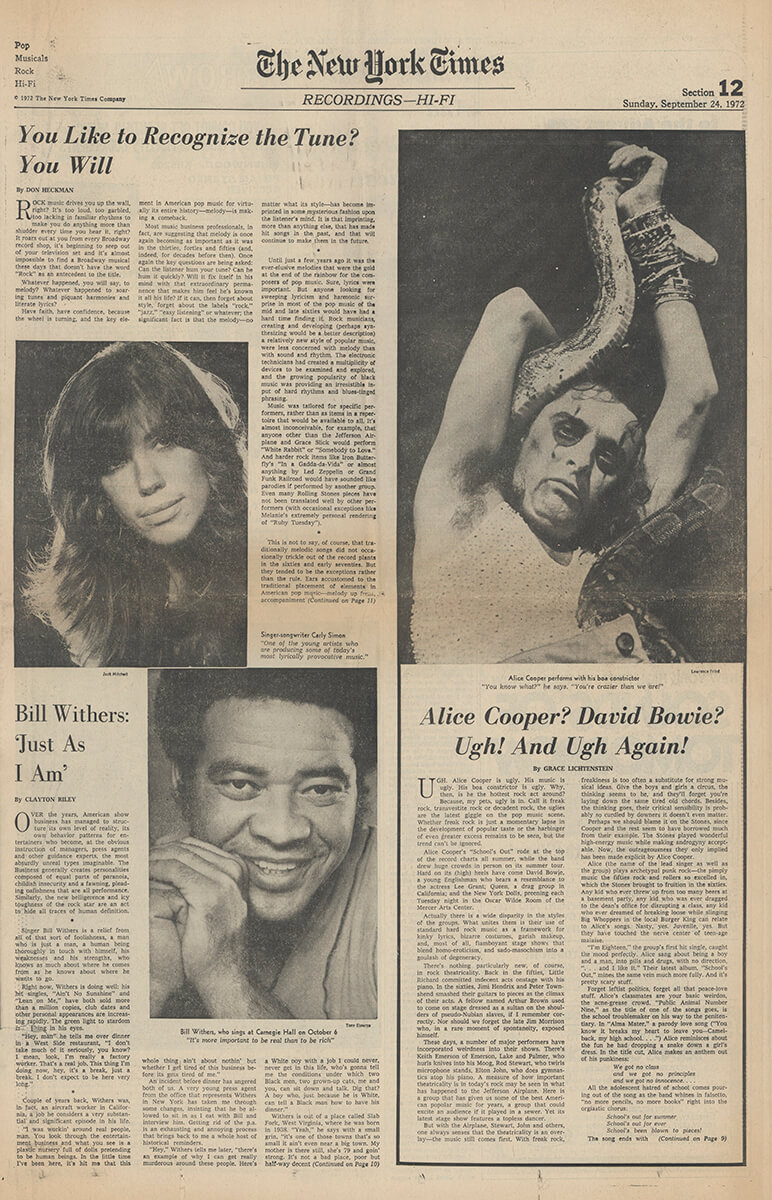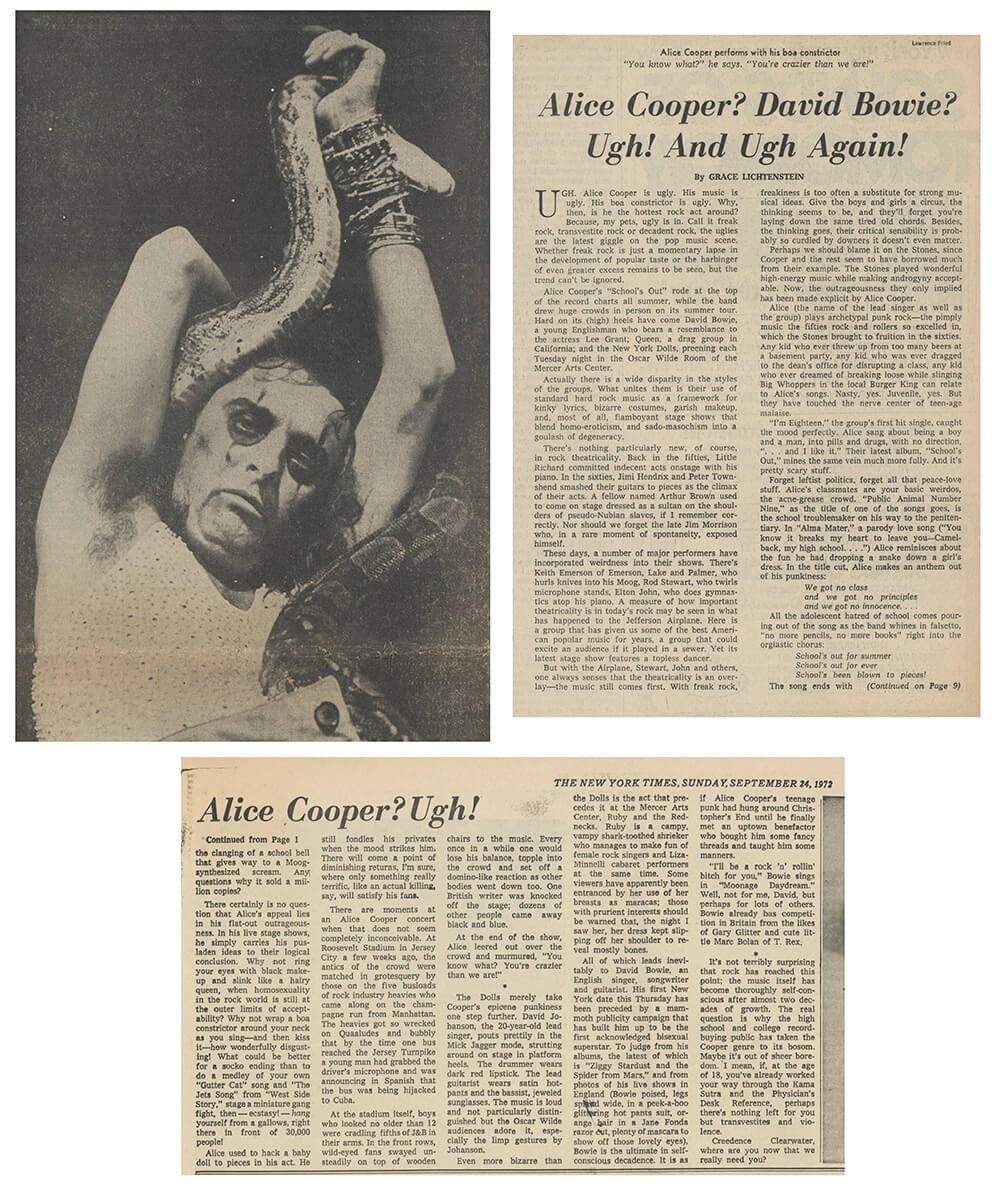Article Database

New York Times
September 24, 1972
Alice Cooper? David Bowie? Ugh! And Ugh Again!
Author: Grace Lichtenstein
UGH. Alice Cooper is ugly. His music is ugly. His boa constrictor is ugly. Why, then, is he the hottest rock act around? Because, my pets, ugly is in. Call it freak rock, transvestite rock or decadent rock, the uglies are the latest giggle on the pop music scene. Whether freak rock is just a momentary lapse in the development of popular taste or the harbinger of even greater excess remains to be seen, but the trend can't be ignored.
Alice Cooper's "School's Out" rode at the top of the record charts all summer, while the band drew huge crowds in person on its summer tour. Hard on its (high) heels have come David Bowie, a young Englishman who bears a resemblance to the actress Lee Grant; Queen, a drag group in California; and the New York Dolls, preening each Tuesday night in the Oscar Wilde Room of the Mercer Arts Center.
Actually there is a wide disparity in the styles of the groups. What unites them is their use of standard hard rock music as a framework for kinky lyrics, bizarre costumes, garish makeup, and, most of all, flamboyant stage shows that blend homo-eroticism, and sado-masochism into a goulash of degeneracy.
There's nothing particularly new, of course, in rock theatricality. Back in the fifties, Little Richard committed indecent acts onstage with his piano. In the sixties, Jimi Hendrix and Peter Townshend smashed their guitars to pieces as the climax of their acts. A fellow named Arthur Brown used to come on stage dressed as a sultan on the shoulders of pseudo-Nubian slaves, if I remember correctly. Nor should we forget the late Jim Morrison who, in a rare moment of spontaneity, exposed himself.
These days, a number of major performers have incorporated weirdness into their shows. There's Keith Emerson of Emerson, Lake and Palmer, who hurls knives into his Moog, Rod Stewart, who twirls microphone stands, Elton John, who does gymnastics atop his piano. A measure of how important theatricality is in today's rock may be seen in what has happened to the Jefferson Airplane. Here is a group that has given us some of the best American popular music for years, a group that could excite an audience if it played in a sewer. Yet its latest stage show features a topless dancer.
But with the Airplane, Stewart, John and others, one always senses that the theatricality is an overlay — the music still comes first. With freak rock, freakiness is too often a substitute for strong musical ideas. Give the boys and girls a circus, the thinking seems to be, and they'll forget you're laying down the same tired old chords. Besides, the thinking goes, their critical sensibility is probably so curdled by downers it doesn't even matter.
Perhaps we should blame it on the Stones, since Cooper and the rest seem to have borrowed much from their example. The Stones played wonderful high-energy music while making androgyny acceptable. Now, the outrageousness they only implied has been made explicit by Alice Cooper.
Alice (the name of the lead singer as well as the group) plays archetypal punk rock — the pimply music the fifties rock and rollers so excelled in, which the Stones brought to fruition in the sixties. Any kid who ever threw up from too many beers at a basement party, any kid who was ever dragged to the dean's office for disrupting a class, any kid who ever dreamed of breaking loose while slinging Big Whoppers in the local Burger King can relate to Alice's songs. Nasty, yes. Juvenile, yes. But they have touched the nerve center of teenage malaise.
"I'm Eighteen," the group's first hit single, caught the mood perfectly. Alice sang about being a boy and a man, into pills and drugs, with no direction, "...and I like it." Their latest album, "School's Out," mines the same vein much more fully. And it's pretty scary stuff.
Forget leftist politics, forget all that peace-Jove stuff. Alice's classmates are your basic weirdos, the acne-grease crowd. "Public Animal Number Nine," as the title of one of the songs goes, is the school troublemaker on his way to the penitentiary. In "Alma Mater," a parody love song ("You know it breaks my heart to leave you — Camelback, my high school...") Alice reminisces about the fun he had dropping a snake down a girl's dress. In the title cut, Alice makes an anthem out of his punkiness:
We got no class
and we got no principles
and we got no innocence...
All the adolescent hatred of school comes pouring out of the song as the band whines in falsetto, "no more pencils, no more books" right into the orgiastic chorus:
School's out for summer
School's out for ever
School's been blown to pieces
The song ends with the clanging of a school bell that gives way to a Moog-synthesized scream. Any question why it sold a million copies?
There certainly is no question that Alice's appeal lies in his flat-out outrageousness. In this live stage shows, he simply carries his pusladen ideas to their logical conclusion. Why not ring your eyes with black makeup and slink like a hairy queen, when homosexuality is the rock world is still at the outer limits of acceptability? Why not wrap a boa constrictor around your neck as you sing — and then kiss it — how wonderfully disgusting! What could be better for socko ending then to do a medley of your own "Gutter Cat" song and "The Jets Song" from "West Side Story," stage a miniature gang fight, then — ecstasy! — hang yourself from a gallows, right there in front of 30,000 people!
Alice used to hack a baby doll to pieces in his act. He still fondles his privates when the mood strikes him. There will come a point of diminishing returns, I'm sure, where only something really terrific, like an actual killing, say, will satisfy his fans.
There are moments at an Alice Cooper concert when that does not seem completely inconceivable. At Roosevelt Stadium in Jersey City a few weeks ago, the antics of the crowd were matched in grotesquery by those on the five busloads of rock industry heavies who came along on the champagne run from Manhattan. The heavies got so wrecked on Quaaludes and bubbly that by the time one bus reached the Jersey Turnpike a young man had grabbed the driver's microphone and was announcing in Spanish that the bus was being hijacked to Cuba.
At the stadium itself, boys who looked no older than 12 were cradling fifths of J&B in their arms. In the front rows, wild-eyed fans swayed unsteadily on top of wooden chairs to the music. Everyone once in a while one would lose his balance, topple into the crowd and set off a domino-like reaction as other bodies went down too. One British writer was knocked off stage; dozens of other people came away black and blue.
At the end of the show, Alice leered out over the crowd and murmured, "You know what? You're crazier than we are!"
The Dolls merely take Cooper's epicene punkiness one step further. David Johanson, the 20-year-old lead singer, pouts prettily in the Mick Jagger mode, strutting around on stage in platform heels. The drummer wears dark red lipstick. The lead guitarist wears satin hot pants and the bassist, jeweled sunglasses. The music is loud and not particularly distinguished but the Oscar Wilde audiences adore it, especially the limp gestures by Johanson.
Even more bizarre than the Dolls is the act that precedes it at the Mercer Arts Center, Ruby and the Rednecks. Ruby is a campy, vampy shark-toothed shrieker who manages to make fun of female rock singers and Liza Minnelli cabaret performers at the same time. Some viewers have apparently been entranced by her use of her breasts as maracas; those with prurient interests should be warned that, the night I saw her, her dress kept slipping off her shoulder to reveal mostly bones.
All of which leads inevitably to David Bowie, an English singer, songwriter and guitarist. His first New York date this Thursday has been preceded by a mammoth publicity campaign that has built him up to be the first acknowledged bisexual superstar. To judge from his albums, the latest of which is "Ziggy Stardust and the Spider from Mars," and from photos of his live shows in England (Bowie poised, legs spread wide, in a peek-a-boo glittering hot pants suit, orange hair in a Jane Fonda razor cut, plenty of mascara to show off those lovely eyes), Bowie is the ultimate in self conscious decadence. It is as if Alice Cooper's teenage punk had hung around Christopher's End until he finally met an uptown benefactor who bought him some fancy threads and taught him some manners.
"I'll be a rock 'n' rollin' bitch for you," Bowie sings in "Moonage Daydream." Well, not for me, David, but 'Perhaps for lots of others. Bowie already has competition in Britain from the likes of Gary Glitter and cute little Marc Bolan of T. Rex.
It's not terribly surprising that rock has reached this point; the music itself has become thoroughly self-conscious after almost two decades of growth. The real question is why the high school and college record buying public has taken the Cooper genre to its bosom. Maybe it's out of sheer boredom. I mean, if, at the age of 18, you've already worked your way through the Kama Sutra and the Physician's Desk Reference, perhaps there's nothing left for you but transvestites and violence.
Creedence Clearwater, where are you now that we really need you?
(From the collection of Anders Mossberg)




